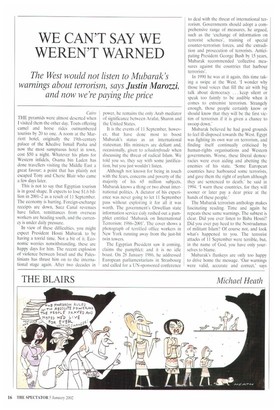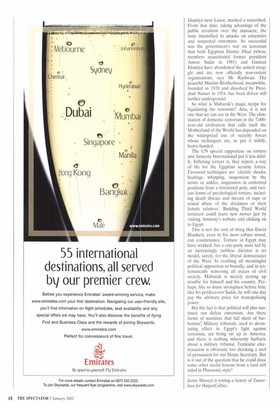WE CAN'T SAY WE WEREN'T WARNED
The West would not listen to Mubarak's warnings about terrorism, says Justin Marozzi, and now we're paying the price
Cairo THE pyramids were almost deserted when I visited them the other day. Touts offering camel and horse rides outnumbered tourists by 20 to one. A room at the Marriott hotel, originally the 19th-century palace of the Khedive Ismail Pasha and now the most sumptuous hotel in town, cost $50 a night. Whatever his plans for Western infidels, Osama bin Laden has done travellers visiting the Middle East a great favour; a point that has plainly not escaped Tony and Cherie Blair who came a few days later.
This is not to say that Egyptian tourism is in good shape. It expects to lose $1.6 billion in 2001-2 as a result of 11 September. The economy is hurting. Foreign-exchange receipts are down, Suez Canal revenues have fallen, remittances from overseas workers are heading south, and the currency is under daily pressure.
In view of these difficulties, you might expect President Hosni Mubarak to be having a torrid time. Not a bit of it. Economic worries notwithstanding, these are happy days for him. The recent explosion of violence between Israel and the Palestinians has thrust him on to the international stage again. After two decades in power, he remains the only Arab mediator of significance between Arafat, Sharon and the United States.
It is the events of 11 September, however, that have done most to boost Mubarak's status as an international statesman. His ministers are defiant and, occasionally, given to schadenfreude when discussing the threat of radical Islam. We told you so, they say with some justification, but you just wouldn't listen.
Although not known for being in touch with the fears, concerns and poverty of the majority of his 65 million subjects. Mubarak knows a thing or two about international politics. A dictator of his experience was never going to let 11 September pass without exploiting it for all it was worth. The government's Orwellian state information service duly rushed out a pamphlet entitled 'Mubarak on International Terrorism: 1986-2001. The cover shows a photograph of terrified office workers in New York running away from the just-hit twin towers.
The Egyptian President saw it coming, claims the pamphlet; and it is no idle boast. On 28 Janualy 1986. he addressed European parliamentarians in Strasbourg and called for a UN-sponsored conference to deal with the threat of international terrorism. Governments should adopt a comprehensive range of measures, he argued, such as the 'exchange of information on terrorist schemes', training of special counter-terrorism forces, and the extradition and prosecution of terrorists. Anticipating President George Bush by 15 years, Mubarak recommended 'collective measures against the countries that harbour terrorists'.
In 1990 he was at it again, this time taking a swipe at the West. 'I wonder why those loud voices that fill the air with big talk about democracy ... keep silent or speak too faintly to be audible when it comes to extremist terrorism. Strangely enough, those people certainly know or should know that they will be the first victim of terrorism if it is given a chance to swoop down.'
Mubarak believed he had good grounds to feel ill-disposed towards the West. Egypt was fighting its own war on terrorism, and finding itself continually criticised by human-rights organisations and Western governments. Worse, these liberal democracies were even aiding and abetting the enemies of his state. 'Some European countries have harboured some terrorists, and gave them the right of asylum although they are sentenced to death,' he said in 1994. 'I warn these countries, for they will sooner or later pay a dear price at the hands of these people.'
The Mubarak terrorism anthology makes fascinating reading. Time and again he repeats these same warnings. The subtext is clear. Did you ever listen to Baba Hosni? Did you ever pay heed to the Nostradamus of militant Islam? Of course not, and look what's happened to you. The terrorist attacks of 11 September were terrible, but, in the name of God, you have only yourselves to blame.
Mubarak's flunkeys are only too happy to drive home the message. 'Our warnings were valid, accurate and correct,' says Nabil Osman, the reptilian chairman of the state information service. 'When you grant these people asylum, you will be bitten by the snake. One day they will wreak havoc in the UK.'
If Mr Osman were a doctor, his bedside manner would not be soothing. In his universe, sympathy is no more than a distant planet: remote, unattainable and irrelevant. 'Whatever the world saw unfolding on 11 September was shocking, but no surprise to Egypt. We've been warning the international community for 15 years. We fought singlehandedly against terrorism on the domestic scene. We sought assistance and extradition arrangements with the major Western capitals, which unfortunately failed dismally. You in the West brushed it off and said Egypt just had a domestic problem and wanted international cover for what it was doing. These people should be swallowing their pride now. It's a belated wake-up call for you.'
It is indisputable that the West conspicuously failed to take Mubarak's warnings seriously, not least on asylum. But, although we missed the symptoms, perhaps it is still not too late to find a cure. For much of the Eighties and most of the Nineties Egypt experienced such violence as to make Northern Ireland look like a picnic. It is now an oasis of tranquillity. The Egyptian President took on the terrorists and — after a long and bloody war — won.
'Right now there are no serious challenges to Mubarak,' says Dia Rashwan, an expert on Egyptian Islamic movements at the Al Ahram Centre for Political and Strategic Studies. 'The Islamic organisations are very tired.' Mr Rashwan says that 17 November 1997, when 58 foreign tourists and four Egyptians were shot by members of the militant group Gamaat
Islamiya near Luxor, marked a watershed. From that date, taking advantage of the public revulsion over the massacre, the state intensified its attacks on extremists and suspected extremists. So successful was the government's war on terrorism that both Egyptian Islamic Jihad (whose members assassinated former president Anwar Sadat in 1981) and Gamaat Islamiya have abandoned the armed struggle and are now officially non-violent organisations, says Mr Rashwan. The peaceful Muslim Brotherhood, meanwhile, founded in 1928 and dissolved by President Nasser in 1954, has been driven still further underground.
So what is Mubarak's magic recipe for liquidating the terrorists? Alas, it is not one that we can use in the West. The elimination of domestic terrorism in the 7,000year-old civilisation that calls itself the Motherland of the World has depended on the widespread use of security forces whose techniques are, to put it mildly, heavy-handed.
The UN special rapporteur on torture and Amnesty International put it less mildly. Inflicting torture is, they report, a way of life for the Egyptian security forces. Favoured techniques are 'electric shocks, beatings, whipping, suspension by the wrists or ankles, suspension in contorted positions from a horizontal pole, and various forms of psychological torture, including death threats and threats of rape or sexual abuse of the detainees or their female relatives'. Budding Third World torturers could learn new moves just by visiting Amnesty's website and clicking on to Egypt.
This is not the sort of thing that David Blunkett, even in his most robust mood, can countenance. Torture in Egypt may have worked; but a one-party state led by an increasingly ruthless dictator is no model, surely, for the liberal democracies of the West, In crushing all meaningful political opposition so brutally, and in systematically removing all traces of civil society, Mubarak is merely storing up trouble for himself and his country. Perhaps, like so many strongmen before him, like his predecessor Sadat, he will one day pay the ultimate price for monopolising power.
But the fact is that political will plus nastiness can defeat extremists. Are there forms of nastiness that fall short of barbarism? Military tribunals, used to devastating effect in Egypt's fight against terrorism, are being set up in America, and there is nothing inherently barbaric about a military tribunal. Testicular electrocution is obviously too shocking a tool of persuasion for our Home Secretary. But is it out of the question that he could draw some other useful lessons from a land still ruled in Pharaonic style?
Justin Marozzi is writing a history of Tamerlane for HarperCollins.
























































 Previous page
Previous page